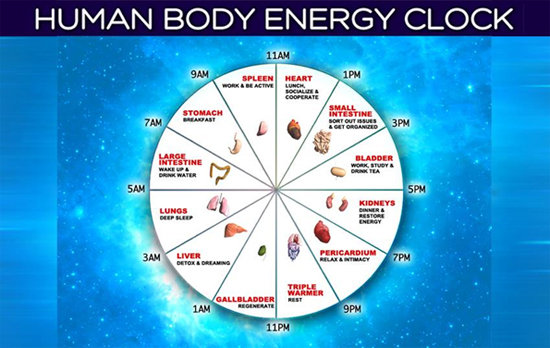Do You Wake Up At The Same Time Every Night? According To Chinese Traditional Medicine, Here’s Why
By Kalee Brown

Many of us have trouble sleeping, whether that be difficulty falling asleep, not getting enough of it, or waking up in the middle of the night. The longer you suffer from one or more of these symptoms, the more you start to define a new “normal” for yourself and forget what a healthy sleeping pattern actually looks like. At least, that’s what some people have experienced. Even though they don’t have any trouble going to sleep, every so often they wake up in the middle of the night at the same time, and then have no issues falling back asleep again. There is a perfectly logical explanation for why this happens and how we can overcome this problem. The solution lies within Traditional Chinese Medicine (TCM) and it has to do with our “body clock”.
What is a “body clock” according to TCM?
According to ancient knowledge within TCM, our bodies run on a “clock” that is reflected through our energy meridians. Meridians are essentially energy highways that hold and transport Qi, blood, and fluids throughout the body. Qi is believed to be everywhere on Earth; when you’re healthy, Qi is flowing freely through you, whereas when you’re unhealthy, you either have a blockage from Qi or your “Qi tank” is low.
Qi moves in two-hour intervals throughout the organ system. During the two-hour period that an organ is reaching its peak, the organ at the opposite side of the clock (12 hours later) is at its lowest function, often referred to as its “ebb”. For example, during the period of time between 1 a.m. and 3 a.m., the liver is approaching its peak by cleansing the blood, whereas the small intestine on the opposite side of the clock is at its lowest point. The small intestine is responsible for the absorption of many nutrients, which explains the ill effects we experience when we indulge in late night snacking. When we eat late at night, our small intestines are functioning at their lowest point and have trouble absorbing the nutrients from our food, making it more difficult for our livers to detoxify our bodies.
Each organ is also associated with an element as it peaks, representing Yin (receiving energy) and Yang (expressing energy) of an element (Earth, Metal, Water, Wood, and Fire).
The elements can be used to categorize general emotions:
– Earth: empathy, sympathy, balanced giving and receiving;
– Metal: grief and loss;
– Water: fear and anxiety;
– Wood: rage, frustration, and resentment;
– Fire: love, hate, and happiness.
How the body clock works
11 am-1 pm – Heart: An excellent time to nap or eat lunch and avoid raising your heart rate. If out of balance, you may feel sadness.
1-3 pm – Small Intestine: The body is digesting food during this time. If out of balance, you may experience indigestion, pain or bloating.
3-5 pm – Urinary Bladder: Salty foods, miso, and vegetable broth strengthen this organ. If out of balance, you may feel timid or experience burning sensations.
5-7 pm – Kidney: This is the optimal timeframe to eat dinner. If out of balance, you may feel fear or exhaustion.
7-9 pm – Pericardium/Erotic Energy Circulation: Represents the best time to socialize or make love. If out of balance, you may have intense food cravings.
9-11 pm – Thyroid/Adrenal/Triple Warmer: Great time to wind down before bed as the blood vessels repair. If out of balance, you may experience headaches.
11 pm-1 am – Gall Bladder: Ideal to go to bed at this time. If out of balance, you may have gall stones, poor self-esteem, or resentment.
1-3 am – Liver: Should be deeply sleeping and dreaming. If out of balance, you may feel anger and frustration, which you will need to resolve to restore your sleep to normal.
3-5 am – Lungs: You should still be sleeping at this time. If out of balance, you may cough, indicating you may have excess mucus and a poor diet.
5-7 am – Large Intestine: Ideal time to wake up and have a bowel movement. If out of balance, you may experience constipation and need to drink more water.
7-9 am – Stomach: Best time to eat breakfast. If out of balance, you may experience acid reflux or need to consume more warm foods.
9-11 am – Spleen: Also a great time to eat breakfast or foods such as yams, dates, and cinnamon. If out of balance, you may experience worrying.
How the body clock relates to our sleeping patterns

It is said that as we sleep, Qi is drawn inward in order to recharge our bodies. The events taking place in our lives often impact our sleep and our organs’ ability to function optimally. By using the body clock, we can analyze why our sleep is disrupted at a particular time and determine how to regulate our sleeping pattern.
If you wake up between:
11 pm and 1 am – Your gall bladder, which is associated with emotional disappointment, bitterness and/or resentment, is active. This indicates you need to implement greater self-acceptance and forgiveness toward others.
1 am and 3 am – Your liver, which is related to feelings of anger, holding grudges, and greater yang energy, is peaking. You can balance your energies by accepting responsibility for fuelling your rage and drinking cold water.
3 am and 5 am – Your lungs, which are connected to sadness and grief, are at their peak. Waking up at this time is a sign that you need to let go of these feelings and connect with your Higher Self. This may also be a sign that you are experiencing a spiritual awakening and that you’re discovering your higher purpose.
5 am and 7 am – Qi energy has moved to your large intestine, which is linked to emotional blockages, guilt, and feeling “stuck”. Drinking water, stretching, using the restroom and addressing these emotions can help to regulate your sleep cycle.
yogaesoteric
July 12, 2018
